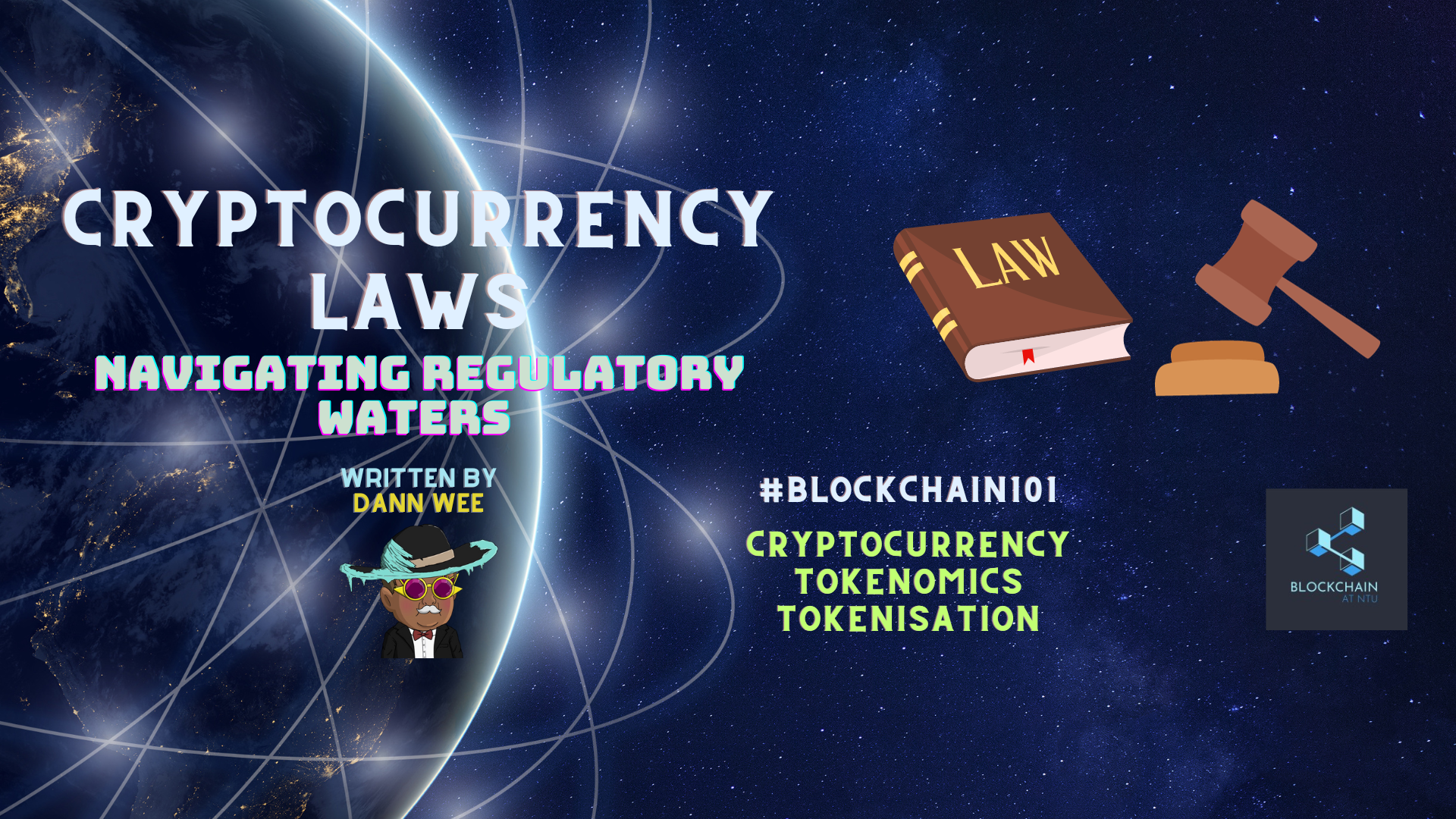
Blockchain 101 #12: Cryptocurrency Laws: Navigating Regulatory Waters
An overview of cryptocurrency regulations and compliance measures that individuals and businesses should be aware of.
In the dynamic realm of finance and technology, the rise of cryptocurrencies has reshaped the way we perceive and engage with traditional monetary systems. As the popularity of digital assets continues to soar, so does the need for a comprehensive understanding of cryptocurrency laws and regulations. This article explores the intricate landscape of cryptocurrency regulations, shedding light on the compliance measures that individuals and businesses must navigate to thrive in this evolving ecosystem.

Cryptocurrencies emerged as a decentralised alternative to traditional financial systems, promoting financial inclusivity and transparency. However, this disruptive nature has prompted regulators worldwide to grapple with the challenge of creating a regulatory framework that fosters innovation while safeguarding investors and maintaining financial stability.
Governments and regulatory bodies have taken various approaches to address the complexities of cryptocurrencies. Some jurisdictions have embraced digital assets, providing clear regulatory guidelines to encourage responsible innovation. Others have approached the matter cautiously, introducing stricter measures to mitigate risks associated with this burgeoning industry.

Classification of Cryptocurrencies: Cryptocurrencies are diverse, ranging from well-established assets like Bitcoin to newer, more experimental tokens. Regulatory approaches often hinge on how these digital assets are classified. Some countries categorise them as commodities, while others view them as securities or currencies. Understanding the classification in a specific jurisdiction is crucial for compliance.
What are Financial Securities?
Securities are fungible and tradable financial instruments used to raise capital in public and private markets. There are primarily three types of securities:
Equity — which provides ownership rights to holders
Debt — essentially loans repaid with periodic payments
Hybrids — which combine aspects of debt and equity.
Anti-Money Laundering (AML) and Know Your Customer (KYC) Regulations: A major concern for regulators is the potential for cryptocurrencies to facilitate illicit activities such as money laundering and terrorism financing. To address this, many countries have implemented AML and KYC regulations, requiring cryptocurrency exchanges and service providers to verify the identities of their users and report suspicious transactions.
Taxation Policies: Cryptocurrency transactions can have tax implications, and regulatory bodies are increasingly focused on ensuring proper tax compliance. Traders and investors should be aware of tax obligations associated with capital gains, income, and reporting requirements to avoid legal consequences.
Securities Regulations: Initial Coin Offerings (ICOs) and Token Offerings have come under scrutiny as potential avenues for fraud. Some jurisdictions have extended securities regulations to cover certain token sales. Clear guidelines on whether a particular token falls under securities regulations are essential to prevent legal complications.

United States: The U.S. has a patchwork of regulatory bodies overseeing cryptocurrency activities, including the Securities and Exchange Commission (SEC) and the Commodity Futures Trading Commission (CFTC). Regulatory clarity is a perpetual challenge, but efforts are being made to provide clearer guidelines for market participants.
Currently, the SEC has several ongoing regulatory lawsuits with cryptocurrency exchanges and cryptocurrency companies which we will dive into in other articles.
European Union: The EU has taken steps toward establishing a comprehensive framework for cryptocurrencies. The Markets in Crypto Assets (MiCA) proposal aims to create a uniform regulatory environment for digital assets across member states.
Asia-Pacific Region: Cryptocurrency regulations in the Asia-Pacific region vary widely. While countries like Japan have embraced digital assets, others, such as China, have imposed stringent bans on certain cryptocurrency activities. On the other hand, Singapore has been generally supportive of the development and use of cryptocurrencies, recognising their potential for innovation and economic growth. The regulatory approach of the Monetary Authority Singapore (MAS) aims to strike a balance between fostering financial innovation and ensuring consumer protection, anti-money laundering (AML) compliance, and financial stability. This diversity underscores the need for a nuanced understanding of regional regulations.

Stay Informed: Cryptocurrency regulations are evolving rapidly. To stay compliant, individuals and businesses must remain informed about changes in local and global regulations. Engaging with legal professionals with expertise in cryptocurrency law is advisable to navigate the complexities effectively.
Implement Robust Compliance Measures: Building a strong compliance framework is imperative for businesses operating in the cryptocurrency space. This includes robust AML and KYC procedures, clear documentation of transactions, and adherence to taxation policies.
Advocate for Regulatory Clarity: Given the dynamic nature of the cryptocurrency industry, advocates argue for clearer and more standardised regulations. Engaging in dialogue with regulators and policymakers can contribute to a more conducive regulatory environment.

As cryptocurrencies continue to redefine the financial landscape, understanding and navigating the regulatory waters becomes paramount. The success of this burgeoning industry depends on the delicate balance between innovation and responsibility. Individuals and businesses must be proactive in staying abreast of evolving regulations, implementing robust compliance measures, and actively participating in the ongoing dialogue to shape a regulatory framework that fosters innovation while safeguarding the interests of all stakeholders. In this intricate dance between technology and regulation, informed and compliant players will undoubtedly lead the way into the future of finance.

We, from Blockchain at NTU, thank you for being part of this enlightening journey and extend a warm welcome to the enthralling universe of blockchain!
NOTE: Articles written by Blockchain at NTU ARE NOT FINANCIAL ADVICE!
Written By:
Dann Wee
Research Director of Blockchain at NTU Club AY23/24
Social Media Links:
| Facebook | Instagram | Twitter | Linkedin | Discord |
| Telegram Group | Telegram Channel |
